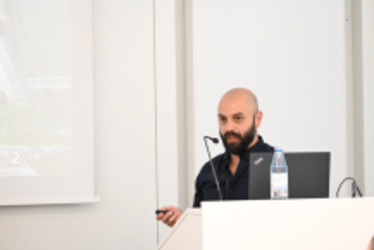Dr. Richard LEMOINE-RODRÍGUEZ

Lehrstuhl für Fernerkundung
![]() +49 (0)931 31-81019
+49 (0)931 31-81019
richard.lemoine-rodriguez@uni-wuerzburg.de
Institut für Geographie und Geologie
Lehrstuhl für Fernerkundung
John Skilton Str. 4a
97074 Würzburg
Ich betrachte Städte als komplexe sozio-ökologische Systeme. Meine Forschung integriert Konzepte und modernste Methoden aus der Stadtökologie, Geoinformatik und den Digital Humanities, um evidenzbasierte Erkenntnisse zu generieren, die zu lebenswerteren Städten beitragen. Mein Schwerpunkt liegt auf der räumlich-zeitlichen Charakterisierung der physischen und sozialen Dimensionen von Städten, mit dem Ziel, komplexe Wechselwirkungen und kontraintuitive Beziehungen zwischen Menschen und ihrem Hauptlebensraum – den Städten – aufzudecken. Mein Ziel ist es, die inhärente Komplexität urbaner Ökosysteme abzubilden, um globale Regelmäßigkeiten sowie fundamentale Unterschiede zwischen Städten zu erkennen und die zugrunde liegenden Eigenschaften zu identifizieren, die ihre Entwicklung antreiben. Städte sind sowohl eine Herausforderung als auch eine Chance auf dem Weg zur Nachhaltigkeit.
Themen:
- Urbanisierung
- Urbane Hitzeinseln
- Stadtmorphologie
- Grüne Infrastruktur in Städten
- Soziale Diskurse
- Ökosystemdienstleistungen
- Landnutzungs- und Landbedeckungsänderungen
- Soziale Ungleichheit
Methoden:
- Multimodale Datenanalyse
- Fernerkundung
- Geoinformatik
- Digital Humanities
- Verarbeitung natürlicher Sprache (NLP)
- Analyse von sozialen Medien
- Künstliche Intelligenz
Seit 2022 Postdoktorand im Geolingual Studies-Projekt.
2017–2022 Promotion (Dr. rer. nat.) an der Ruhr-Universität Bochum. Dissertation: Urban form, urban warming and time. From global regularities to local heterogeneities.
2015–2017 Wissenschaftlicher Mitarbeiter am Forschungszentrum für Umweltgeographie (CIGA) der Nationalen Autonomen Universität von Mexiko (UNAM).
2013–2015 M.Sc. in Geographie, Forschungszentrum für Umweltgeographie (CIGA) der Nationalen Autonomen Universität von Mexiko (UNAM). Masterarbeit: Conurbations of the city of Morelia, Michoacán, in the period of 1970–2010 and its influence on the sense of belonging of its inhabitants.
2012–2013 Wissenschaftlicher Mitarbeiter am Institut für Ökologie (INECOL).
2008–2012 B.Sc. in Biologie, Fakultät für Biologie, Universität Veracruz (UV, Mexiko). Bachelorarbeit: Changes in the vegetation cover of the city of Xalapa-Enríquez, Veracruz and surrounding areas in the period of 1950–2010.
-
. (2025): Distributions of types of urban fabrics around the world: Beyond narratives of global regularities and local specificities. In: Applied Geography, 184, 103770.
-
. (2025): Universal patterns of intra-urban morphology: Defining a global typology of the urban fabric using unsupervised clustering. In: International Journal of Applied Earth Observation and Geoinformation, 141, 104610.
-
. (2025): Was global urbanization from 1985 to 2015 efficient in terms of land consumption?. In: Habitat International, 160, 103397.
-
. (2025): Connection beyond borders: exploring sense of belonging across urban satellites conurbed by a medium-sized Mexican city. In: Urban Ecosystems, 28 (1), 1-14.
-
. (2025): The digital urban frontier: Disparities in social media activity between consolidated and newly urbanized areas in Africa. In: Applied Geography, 181, 103687.
-
. (2024): The voices of the displaced: Mobility and Twitter conversations of migrants of Ukraine in 2022. In: Information Processing & Management, 61 (3), 103670.
-
. (2024): ¿Es detectable empíricamente la protección normativa del territorio? Análisis de las tendencias de temperatura y vegetación del área norte de Bogotá con sensores remotos. In: Investigaciones Geográficas, (113)
-
. (2024): Unveiling urban ecological integrity: spatially explicit assessment in contrasting environments. In: Urban Ecosystems
-
. (2024): Same planet but different worlds! Diverging convergence pattern of urban form typologies across 413 cities with million+ inhabitants and their sustainability trade-offs ☆. In: Habitat International, 145, 103024.
-
. (2023): Cold spots or hot spots Thermal patterns and cold airflow on tailings piles in the Ruhr area. In: Berichte Geographie und Landeskunde, 96 (3), 189-214.
-
. (2022): Intraurban heterogeneity of space-time land surface temperature trends in six climate-diverse cities. In: Science of The Total Environment, 804, 150037.
-
. (2022): Too hot to handle? On the cooling capacity of urban green spaces in a Neotropical Mexican city. In: Urban Forestry & Urban Greening, 74 (October 2021), 127633.
-
. (2022): Are Wildfires in the Wildland-Urban Interface Increasing Temperatures? A Land Surface Temperature Assessment in a Semi-Arid Mexican City. In: Land, 11 (12)
-
. (2022): Does urban climate follow urban form? Analyzing intraurban LST trajectories versus urban form trends in 3 cities with different background climates. In: Science of The Total Environment, 154570.
-
. (2022): A Novel Approach for the Assessment of Cities through Ecosystem Integrity. In: Land, 11 (1), 3.
-
. (2020): The global homogenization of urban form. An assessment of 194 cities across time. In: Landscape and Urban Planning, 204, 103949.
-
. (2019): Six decades of urban green change in a neotropical city: a case study of Xalapa, Veracruz, Mexico. In: Urban Ecosystems, 22 (3), 609-18.
-
. (2017): Land use/land cover change detection combining automatic processing and visual interpretation. In: European Journal of Remote Sensing, 50 (1), 626-35.
-
. (2017): Evaluación de las tasas de deforestación en Michoacán a escala detallada mediante un método híbrido de clasificación de imágenes SPOT. In: Madera Bosques, 23 (2)
-
. (2016): Toward a near-real time forest monitoring system [Technical note]. In: Investigaciones Geograficas, 2016 (91)
-
. (2024): Avances En El Estudio De Islas De Calor Urbano En América Latinahg. von Richard Lemoine-Rodríguez, Azucena Perez-Vega, und J-F Mas
-
. (2023): Desarrollo Urbano En Armonia Con Los Servicios Ecosistemicos. Plan De Ordenamiento Zonal Del Norte, Bogota D.C.
-
. (2017): Situación Ambiental De La Cuenca Del Río Santiago-Guadalajarahg. von M Bollo
-
. (2025): The uneven distribution of morphological diversity: A global investigation on intra-urban forms. In: 2025 Joint Urban Remote Sensing Event (JURSE), 1-4.



